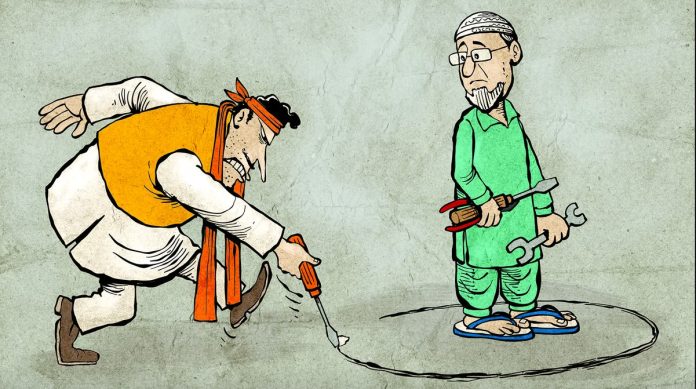26 August 2024: In June 2024, the Hindu Janjagriti Samiti organised the Vaishvik Hindu Rashtra Mahotsav in Goa, themed “From Hindu Nation to Hindu World.” Among the key speakers was Virendra Pandey, the founder of the Shoorvir Programme, a service designed to connect Hindu service providers with Hindu clients. This programme, however, has drawn significant criticism for its overtly discriminatory nature, particularly against the Muslim community, writes the News Laundry on Saturday.
During his speech at the event, Pandey issued a stark warning about allowing “those people” into one’s home. He suggested that when Hindu men leave their homes for work, they might inadvertently allow non-believers, particularly Muslims, into their homes under the guise of service providers. Pandey insinuated that this could lead to dangerous situations, hinting at a supposed connection between Muslim service providers and acts of “jihad.”
Pandey’s rhetoric was clear in its intent, urging Hindus to economically boycott Muslim service providers. He claimed that Muslim workers deliberately undercut Hindu service providers by offering lower prices, aiming to dominate the market. “In 10 years, there will be many areas where you won’t find a Hindu worker,” Pandey warned, calling on his audience to fight back, if not physically, then by boycotting Muslim businesses.
The Shoorvir Programme, which markets itself as an exclusive platform for Hindu service providers, echoes Pandey’s sentiments. Described on its website as a “Nobel cause,” the programme aims to ensure that every penny spent by Hindus remains within the community. The website is adorned with images of historical Hindu figures who fought against Muslim rulers, further emphasizing the programme’s divisive nature.
This initiative has not only garnered support from certain sections of the Hindu community but also from prominent political figures. Union Minister Giriraj Singh, for instance, posted a video on social media praising the Shoorvir Programme. The video depicted a Hindu household rejecting a Muslim service provider in favour of one from the Shoorvir network.
The Shoorvir Programme’s website boasts that it has provided over 7,000 services across India. However, there are inconsistencies on the site, such as incomplete sections and placeholder texts. Despite these, the programme claims to connect Hindus with a wide range of service professionals, from electricians to caterers, exclusively serving the Hindu community.
Critics argue that the Shoorvir Programme is exploiting legal loopholes. Senior lawyer Sanjay Hegde noted that while Article 15 of the Indian Constitution prohibits the government from discriminating, there is no law that currently addresses individual discrimination in hiring service providers based on religion.
The programme is linked to several well-known advocates of a “Hindu Rashtra,” including controversial figures like Yati Narasimhanand Saraswati, known for his anti-Muslim hate speech. The programme is also associated with organisations like the Hindu Janajagruti Samiti, which is committed to establishing a Hindu nation.
While some service providers have reported receiving jobs through the Shoorvir Programme, the initiative’s reach remains questionable. Nonetheless, the support from political leaders like Giriraj Singh lends it a degree of credibility that could persuade many to overlook its fundamentalist agenda.
As the Shoorvir Programme continues to grow, it raises serious concerns about the increasing normalisation of communalism in India. The programme’s open call for the economic boycott of Muslims is a troubling sign of deepening religious divides in the country.




